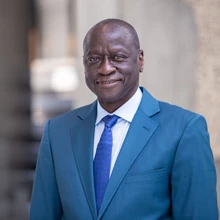 A busy shopping center in downtown Monrovia. Credit: Nurudeen Sanni.
A busy shopping center in downtown Monrovia. Credit: Nurudeen Sanni.
Liberia is a country of firsts – and contrasts. Founded in 1847, Liberia is Africa’s first republic. The country elected Africa’s first female president and boasts two Nobel laureates among its 5.6 million strong population. Liberia’s abundant forests are the lungs of West Africa, representing a global biodiversity hotspot. Richly endowed with natural resources – including gold, diamonds, iron ore and many others – Liberia’s greatest asset are its people. Some 40% of Liberians are under the age of 15, presenting potential for an enormous demographic dividend in years to come.
Yet Liberia’s development story has been marked by steep gains and equally steep reversals. Once a middle-income country, fourteen years of brutal civil conflict stripped Liberia of two generations worth of progress. Entrenched inequality fueled by rents from natural resource extraction contributed to the conflict. Liberia emerged from conflict in 2003, with peace restored. However, the scale of the post-conflict devastation was exceptional, with large-scale loss of life, displacement, and gender-based assault and nearly complete destruction of infrastructure – from schools, to roads, to energy infrastructure.
Building on hard-won gains, Liberia needs a “reset” to avoid a lost century
Over the past two decades, Liberia succeeded in delivering four democratic presidential elections and peaceful electoral transitions – an impressive and hard-won national achievement. Now more than ever, the urgent challenge is to ensure that all Liberians, including women and youth, can enjoy dividends of peace through better jobs and better quality of life. Real per capita income in Liberia rose 34% from 2004 to 2013 but declined 6.6% to $716 by 2024. With GDP now at levels last seen in the 1940s, Liberia needs bold action to avoid the risk of a lost century.
Across Liberia’s 15 counties, the urgent need to scale up results on Liberia’s Vision 2030 is palpable. The ambitious new national development plan – the ARREST Agenda for Inclusive Development (AAID) – aims to lift incomes per person by 25% and to reach lower-middle country income status by 2030. The new plan seeks to “reset” Liberia’s commodity-driven growth model that has failed to deliver sustained progress.
New World Bank Group Country Partnership Framework: What’s new, and why does it matter?
Anchored in 63 years of partnership, the new World Bank Group (WBG) Country Partnership Framework (CPF) marks another “first” for Liberia. With focus on building foundations for more and better jobs, the Liberia CPF is the first to fully align with the new WBG Country Engagement Model – also benefitting from the first-ever Knowledge Advisory Team (KAT). It maximizes WBG comparative advantages, draws on global knowledge and is strongly aligned with Liberia’s AAID. The CPF reflects a cohesive WBG approach – with IDA-financing for education, energy, and governance helping to create conditions for increased private investment and job creation.
The new WBG country engagement model emphasizes selectivity – which was challenging given Liberia’s expansive needs and the increasing scarcity of concessional financing. Yet these factors also make selectivity necessary. Reflecting the greater selectivity of the new model, the CPF will deliver four outcomes (linked to the new corporate scorecard) that underpin the aim to build foundations for more and better jobs:
- Reducing learning poverty. Liberia’s weak education system is a driver of its low human capital, a key precondition for jobs. On average, Liberian children receive 4.4 years of schooling by their 18th birthday; adjusted for learning, this shrinks to 2.2 years – the lowest value on earth. The IDA-financed flagship foundational learning project, “Excellence in Learning in Liberia (EXCEL),” will be the first operation to be approved under the new CPF.
 Source: World Bank.
Source: World Bank.
- Increasing access to energy. Anchored in Mission 300, the WBG will support achievement of Liberia’s ambitious Energy Compact. This is a flagship area for One WBG collaboration. Upcoming investment projects include a 40-60 MW extension of the Mount Coffee Hydropower Plant and the proposed development of the 150-190 MW St. Paul 2 hydropower project together with other financiers among others, including off-grid investments.
- Strengthening accountable and transparent governance. Together with other partners, we will support Liberia to increase domestic resource mobilization and digitally enabled services to better serve Liberians nationwide. The CPF discusses Liberia’s fragile macroeconomic and debt situation and notes our commitment to support Liberia to maintain a sound macroeconomic policy framework.
- Mobilizing private investment – especially linked to diversification and Liberia’s comparative advantages of agriculture, agribusiness, and sustainable forestry. The WBG will aim to improve the productivity of select agriculture value chains, through an integrated ecosystem approach that includes the forest sector to promote agribusiness growth, job creation and sustainable forest management.
This groundbreaking new CPF aims to support Liberia’s efforts to reset its development model and realize a more prosperous future. Our focus on building foundations for more and better jobs will keep the Liberian people at the center of all we do. While transformation may not come easily, Liberia’s unique heritage, endowments, and potential give reason for hope.


Join the Conversation